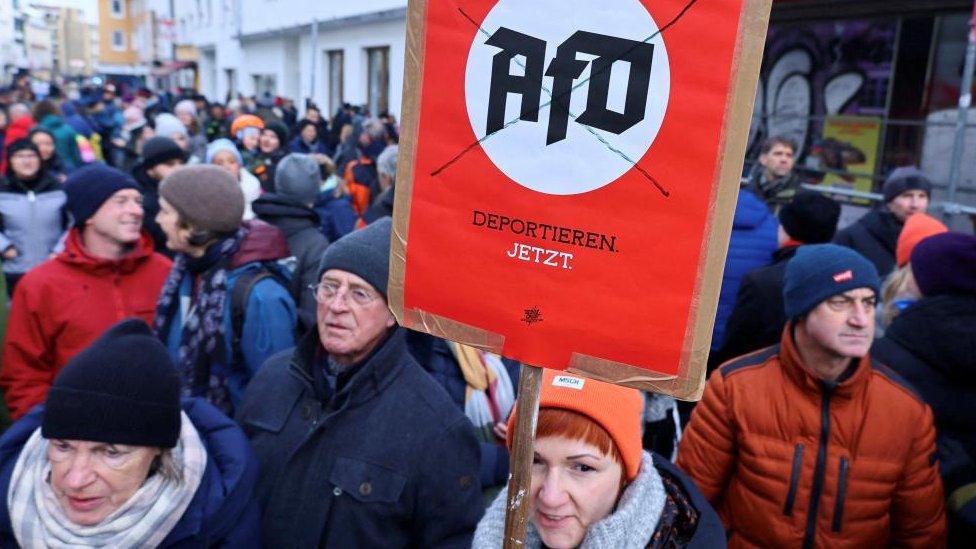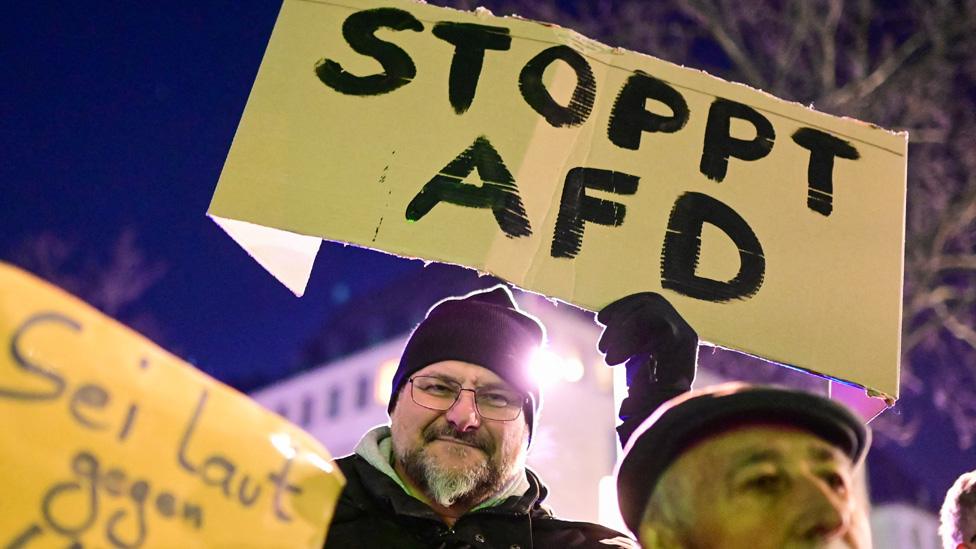German court ban on state funding for Heimat seen as model for AfD
- Published

A million Germans have taken part in protests across Germany against the rise of the AfD in recent days
Germany's constitutional court has ruled that a right-wing extremist party should be barred from receiving further state funding and tax breaks that German parties legally receive.
The court's ruling on excluding Die Heimat, formerly known as the NPD, comes after days of German protests against the rise of the far right.
A million Germans have taken part.
The ruling also marks the first time that Germany has cut state financial support for a party without banning it.
Many now see this as a model for dealing with increasing support for the far-right Alternative for Germany party.
Nationally the AfD polls typically above 20% at the moment, and above 30% in eastern Germany, where key regional elections will be held later this year.
So the constitutional court's decision in Karlsruhe is a boost for the protesters who have filled the streets of German towns and cities in recent days, including Hamburg, Munich, Cologne, Frankfurt and Berlin.
Organised by church groups, environmentalists and left-wing activists, Sunday's demo against the far right in Berlin was large, with more than 100,000 people, and certainly diverse.
Two elderly Catholic nuns carried a homemade cardboard sign against right-wing extremism.
Nearby a gay couple held up a colourful banner while a toddler strapped in the front of a passing cargo-bike sang "all of Berlin hates the AfD".

The AfD is running at around 22% in the polls, well ahead of Chancellor Olaf Scholz's centre-left SPD
Tuesday's court ruling comes after earlier unsuccessful attempts to ban Die Heimat's predecessor outright.
In 2017 a case to outlaw the then NPD failed for the second time, after judges ruled that the party was too insignificant to be banned. The court did however accept that the NPD's racist, ethno-nationalist stance made the party unconstitutional and anti-democratic.
That decision paved the way for a case to be made that a party that was trying to undermine the German democratic state should not receive taxpayer support.
The Heimat (Homeland) party only has a few thousand members and for the past few years has received no direct funding because its share of the vote in elections is too small. But it does benefit from sizeable tax breaks on donations and money bequeathed.
Cutting these benefits effectively wipes out the party's funds.
Not everyone at the mass anti-AfD demonstrations - organised by political leaders, trade unions, religious groups and grassroots NGOs such as "Grannies against the far-right" - wants the AfD to be banned.
Some fear that would simply play into the party's narrative that it is being victimised by mainstream society and would galvanise support.
There are also high legal hurdles to banning a party. Constitutionally it is possible, but it is difficult to prove that an entire party is anti-democratic or unconstitutional, rather than just individual MPs or members. Particularly since the AfD is a large and diverse party, whose leaders are careful to stay on the right side of the law.
Some politicians have called for state funding for the AfD to be cut, as has happened with Die Heimat, claiming that legally this may be more feasible. But the case to stop financing Die Heimat was successful because the party had already been judged as unconstitutional, so the legal hurdles may not in fact be much lower.
Either way, for protesters calling for action against the far-right, Tuesday's court ruling may feel like progress.
Related topics
- Published20 January 2024

- Published15 January 2024
